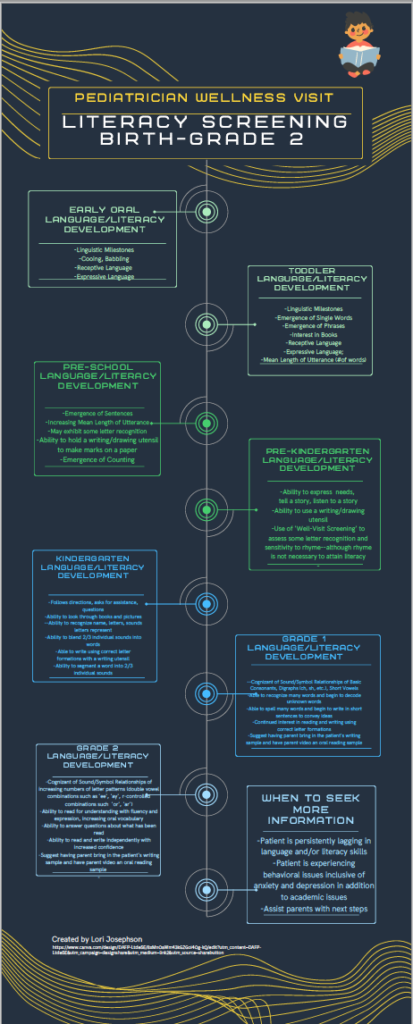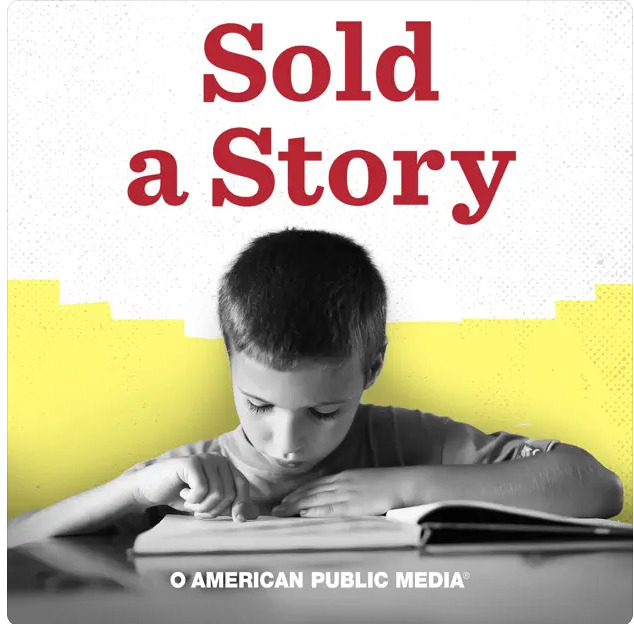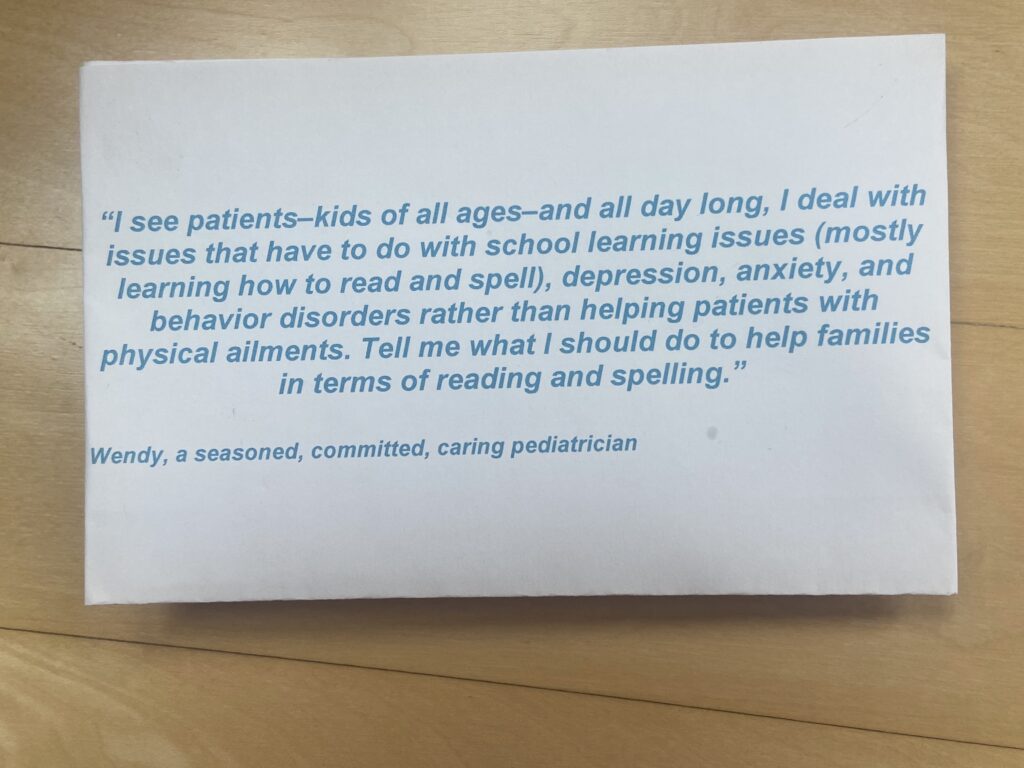IT WAS JUST ANOTHER BIKE RIDE, AND….
On a relatively cool Sunday morning in August, I set out to complete a 50 mile bike ride to benefit our local Ohio and Erie Towpath Coalition. Between my husband and me, we raised several thousand dollars as per the support of our family and friends. I hadn’t completed one of these ‘rides’ in several years and honestly, I was pretty nervous about finishing the ride–and finishing in an appropriate time frame so as to avoid totally embarrassing myself!
I RODE WITH A PEDIATRICIAN, AND…
To my surprise, I ended up meeting Wendy, a pediatrician, who practices (and avidly bikes) a couple of hours west of my home. She is the friend of a friend who we had arranged to bike with several weeks prior to the ride.
So, we ended up biking together, learned a little about each other’s lives, and kept pedaling along. She wanted to know EVERYTHING and ANYTHING I knew about literacy and language learning. Needless to say, the ride went by more quickly than any other long ride I had ever completed.
This is what she said:
“I see patients–kids of all ages–and all day long, I deal with issues that have to do with school learning issues (mostly learning how to read and spell), depression, anxiety, and behavior disorders rather than helping patients with physical ailments. Tell me what I should do to help families in terms of reading and spelling.”
Wendy, a seasoned, committed, caring pediatrician
It stopped me cold. I knew this was going on all over the country, in fact, likely the world. I knew COVID had exacerbated learning loss over the past two years. I knew Wendy wanted and needed access to the right information and that she was surely smart enough to learn what she needed to learn.
Read on to learn what I shared. Learn about it yourself and then share it with your child’s pediatrician. In fact, if you are a teacher, share it with the families of your students so that they can share it with their children’s pediatricians.
PLAYBOOK FOR TODAY’S PEDIATRICIANS
- BONE UP ON LINGUISTIC (AND EVEN MOTOR) MILESTONES
- Work with families to help them be aware of and understand oral language development. Here is a list of typical milestones with ranges.
- The isolation resulting from COVID has absolutely had an impact on the oral language development of children, particularly the youngest of the bunch.
- Motor development works hand in hand with oral language development. Paying attention to articulatory skills is especially valuable in children of all ages.
- Provide suggestions to families enhancing oral language and motor development (see my final bullet point below).
- Conduct a ‘Well-Visit Screening’ for both younger patients (pre-literacy skills). The Reading House will screen for emergent readers’ ability to name letters and recognize rhyme. I would suggest adding the infographic I created to the screening. It takes less time than you think.

That said, let’s not neglect to conduct a well-visit screening for older students. I was unable to find a good screening tool upon searching, so I created one.

- LEARN ABOUT PHONOLOGICAL AWARENESS AND PHONEMIC AWARENESS
- Phonological Awareness involves an awareness of the individual sounds in spoken words including counting words in sentences, counting syllables in words, rhyming, oral identification of the beginning, middle, ending sounds in words (‘cat’=/k/, /ǎ/, /t/). That said, none of these are absolute precursors to literacy development, particularly rhyming. Skill in phonological awareness; however, is correlated with literacy development. Most particularly, if older students have weak Phonological Awareness, it could be a ‘red flag’.
- Phonemic Awareness IS necessary in order to develop the literacy skills of reading and spelling. Phonemic Awareness is the ability to blend individual sounds (phonemes) together to read words, as well as segment individual sounds (phonemes) to spell words, optimally taught with the use of letters (graphemes).
- Read all about it in the new International Dyslexia Association Fact Sheet specifically on these topics.
- LEARN ABOUT HOW THE BRAIN LEARNS TO READ AND SPELL: THE SCIENCE OF READING
- Reading and spelling are not ‘natural’ occurrences; humans need to be taught “the code” and the structure of the English language (or any other language being taught in written form).
- You can find The Reading League’s Definitive Guide to the Science of Reading here. It’s not long.
- Here is a link to Stanislaus Dehaene’s video of how the brain learns to read. Great appeal to medical professionals!
- Time magazine is one of many mainstream publications featuring Science of Reading information. Psychology Today also featured a recent article.
- Would you rather listen? Maybe on your drive home or while taking a walk? Some podcasts focused on the Science of Reading include: Science of Reading; Melissa and Lori Love Literacy; Teaching, Reading and Learning: The Podcast; and Emily Hanford’s Sold a Story. Sold a Story is particularly powerful and current.

This is a snippet of a parent of a 12 year-old describing her child’s experiences from Ms. Hanford’s podcast:
“He doesn’t look at all the letters in words; he doesn’t like reading and he doesn’t like school…or all the words in sentences. And reading is miserable for him…he omits words, he adds words, he’ll substitute a word that makes sense in the context, that has a few of the same letters as the actual word, and just cruise right on.….I am ‘full of regret’…because I knew something was wrong when my son was little.”
-Sold a Story by Emily Hanford.
- FIND OUT ABOUT HOW READING IS TAUGHT IN THE SCHOOLS OF YOUR PATIENTS
- If you see patients generally in the same geographic area/school district, contact the school district directly to inquire as to the curricula used. Also contact any schools in the parochial, private, or charter school arenas.
- Ask patients to bring in samples of their child(ren)’s written work, as well as any questions the families may have.
- What curricula are aligned with the Science of Reading (explicit instruction of sound/symbol relationships, decodable readers, simultaneous instruction of spelling and reading) vs. Balanced Literacy (Leveled Readers, 3 cueing system)? Here is an infographic that will help you, as well as this website. Perhaps an instructional mismatch is unintentionally the cause of reading/spelling issues. If a mismatch is the case, share the information in this article with your patients. Speak to the school district administrators and/or board members. One more suggestion: Watch The Purple Challenge Part 1 and Part 2.
- WHICH CAME FIRST? THE CHICKEN OR THE EGG?
- Attempt to discern if the child’s primary issue is one of language literacy OR social emotional learning.
- Oftentimes, children who have difficulty in the classroom (literacy related or otherwise) present foremost as behavioral and/or attentional issues. Could it be that the behaviors are secondary consequences of the learning issues?
- Asking questions such as: How do you like school? What is your favorite subject and why? What is your least favorite subject and why? What do you do when you are not in school? Do you read outside of school just for fun?
- The responses you get may help pinpoint the primary issues which present. This NY Times podcast highlights the mental health issues plaguing many of today’s teens.
“So for the last 10 to 15 years, pediatricians were told that they should be able to handle bread-and-butter attention deficit disorder. But on top of that, we’ve also had to take care of a lot of children with anxiety, depression —I didn’t have teenagers come in and say, I think I’m anxious. I think I need anxiety medicine. And of course, today, I see it all the time.“
-Dr. Melissa Dennison, rural Kentucky pediatrician as interviewed on The Daily for the NY Times
- SUSPECT DYSLEXIA? HERE ARE SOME RESOURCES TO SHARE…AFTER ALL, OCTOBER IS DYSLEXIA AWARENESS MONTH
- Share The International Dyslexia Association website. Fact Sheets are particularly noteworthy. They are available in Spanish and have an audio feature.
- Share the Yale Center for Dyslexia and Creativity website.
- Share the Reading Rockets website for information including a course entitled Reading 101: A Guide for Parents.
- Ask families if there is a history of reading/spelling/writing and even math issues in the family as part of the intake information.
- PREPARE A LIST OF FREE RESOURCES TO SHARE WITH FAMILIES
- This website, Parenting to Foster Language and Literacy, contains a very large My Favorite Resources Tab. Check it out, as it includes websites, podcasts, videos, articles, books, and activities for parents to enhance literacy with their children. If you subscribe to my blog, you will receive a FREE Make It Take It video explaining Hollis Scarborough Reading Rope in user-friendly language.
- Dolly Parton’s Imagination Library is a book gifting program that mails free books to children from birth until they begin school in the USA and other countries.
- Use families’ reliance upon social media to benefit your patients. Share Facebook Groups, Instagram, Twitter handles including the many Science of Reading Facebook Groups in existence. I have them listed in the My Favorite Resources Tab. Many of these groups offer FREE ongoing courses and webinars for both families and educators. Take advantage of these opportunities for FREE learning.
- And don’t forget to remind families to take their children to the local public library. It’s not just for borrowing books these days. Children’s sections offer activities, play areas, and programs inclusive of an old-fashioned ‘Story Time’.
I know you are busy and here I’ve added to your ‘to do’ list, but…as is often said, “Children are our future.”
Children need caregivers (inclusive of pediatricians and teachers) to ensure their physical, mental, and intellectual well-being to place them in a position where they are able to learn..
The 21st century has turned out to be one of distinct challenges in terms of raising kids forgetting about the pandemic. I am thinking most about how raising children has been forever altered due to ‘technological advances’, but that is another article altogether! Let’s work together to help our kids.


